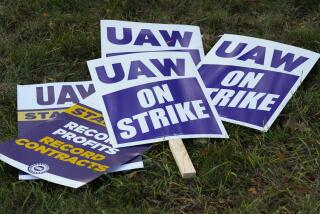M-Class Production to Double
- Share via
DETROIT — Seeking to expand its popular and highly profitable luxury sport-utility vehicle business, DaimlerChrysler said Monday it will double capacity at its U.S. factory to 160,000 vehicles.
DaimlerChrysler will invest $600 million to expand its plant in Vance, Ala., which makes the M-Class sport-utility vehicle, and add up to 2,000 jobs to the 1,900 workers already there. “The worldwide demand for the M-Class has exceeded all expectations and shows that Mercedes-Benz made the right decision when it entered the sport utility market and came to the U.S. to build it,” said Juergen Hubbert, the DaimlerChrysler board member in charge of the Mercedes-Benz brand.
“Our success would not have been possible without the great partnership we formed with the state of Alabama and without the strong work force that we have found here,” Hubbert said.
While Hubbert didn’t mention unions in referring to the work force, auto makers have been attracted to Alabama because of the weakness of unions in the state. The United Auto Workers has failed to organize workers at the existing Mercedes plant. DaimlerChrysler claims it is neutral in union drives, but UAW leaders have accused the company of trying to block unionization efforts.
The German-U.S. auto maker may introduce a new Mercedes-Benz vehicle to be made at the expanded Alabama factory, industry analysts say.
“Mercedes is in an unusual position. They don’t want to build too many of one thing: If you commoditize Mercedes, then you lose the cachet,” said Jim Hall, of the AutoPacific consultant group in Detroit.
“They’re probably going to add a product variant, something they don’t have yet: that’s where the growth is,” said Hall, who said he believes it will be “an upscale people mover, but not a van.”
Mercedes has a wide choice of vehicles it could build there, including a car-truck or van-SUV “crossover” vehicle, or a larger version of the M-Class SUV, said Christopher Cedergren of the industry forecasting firm Nextrend in Thousand Oaks.
“With the continuing strength of the luxury market and confidence in their brand, they have a lot of options,” Cedergren said. “Even if the truck market were to soften, the beauty of their plan is that the line would be flexible enough to change products quickly.”
Whatever is produced at the plant, much of it will be destined for California. “Mercedes is booming out here in Southern California, so a lot of what is going to be produced in Vance will be sold here,” said Cedergren, noting that 20%-25% of Mercedes-Benz vehicles sold in the U.S. are purchased in California.
The current factory occupies about 1.2 million square feet. The expansion could add an additional 1.5 million square feet to the factory.
DaimlerChrysler announced it would build a plant in Alabama in 1993. Work began on the initial factory in 1994 and production started in 1997, with the vehicles going on sale in the fall of that year. The plant now makes the ML320, ML430, ML55 AMG for the U.S. market, and the ML270 CDI diesel version for export to Europe.
Initial capacity at Alabama was 65,000 vehicles, but two expansions brought capacity to 80,000. To date the factory has produced about 220,000 M-Class SUVs. They are exported around the world, but more than half are sold in the U.S. DaimlerChrysler began building M-Class SUVs in Austria last year.
When the factory was first announced, the state gave the then Daimler-Benz $253 million in incentives. Alabama Gov. Donald Siegelman said Monday the state would provide DaimlerChrysler $119 million in incentives including $65 million in improvements, such as for roads, and $54 million in tax breaks.
U.S. sales of the M-Class numbered about 29,000, or up 24%, in the first seven months of the year over 1999, while in Western Europe they were up more than 60%.
The total capital investment made by DaimlerChrysler since 1994 in Alabama could be more than $1.3 billion, once the expansion is complete.
Siegelman hailed the partnership between his state and the German auto maker. “Alabama continues to stake its claim as a formidable force in the automotive industry and in the world of business,” he said.






